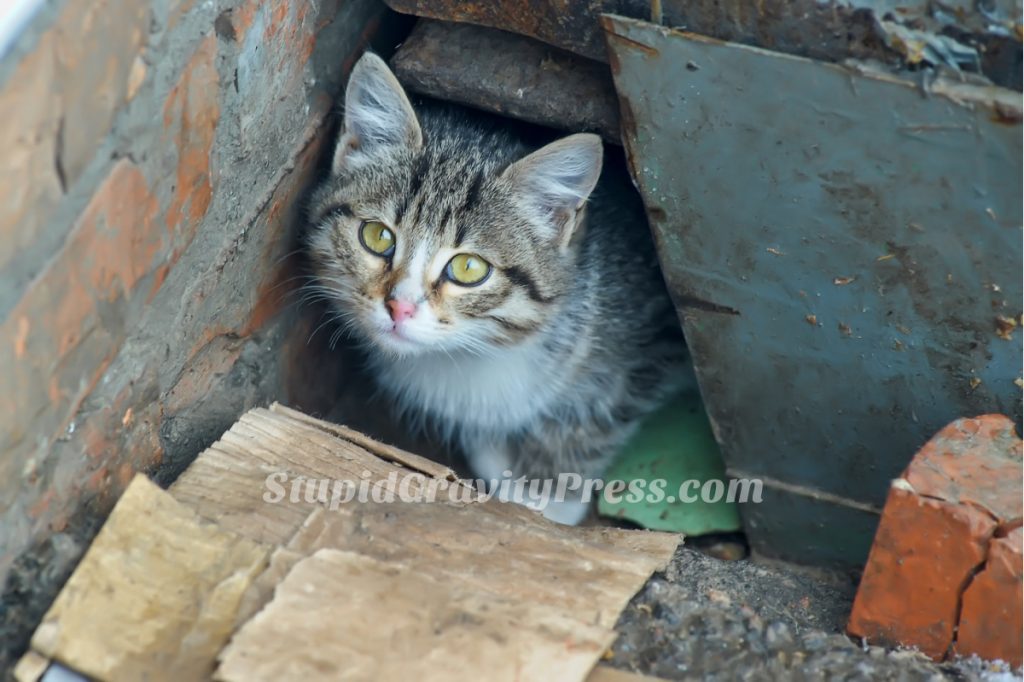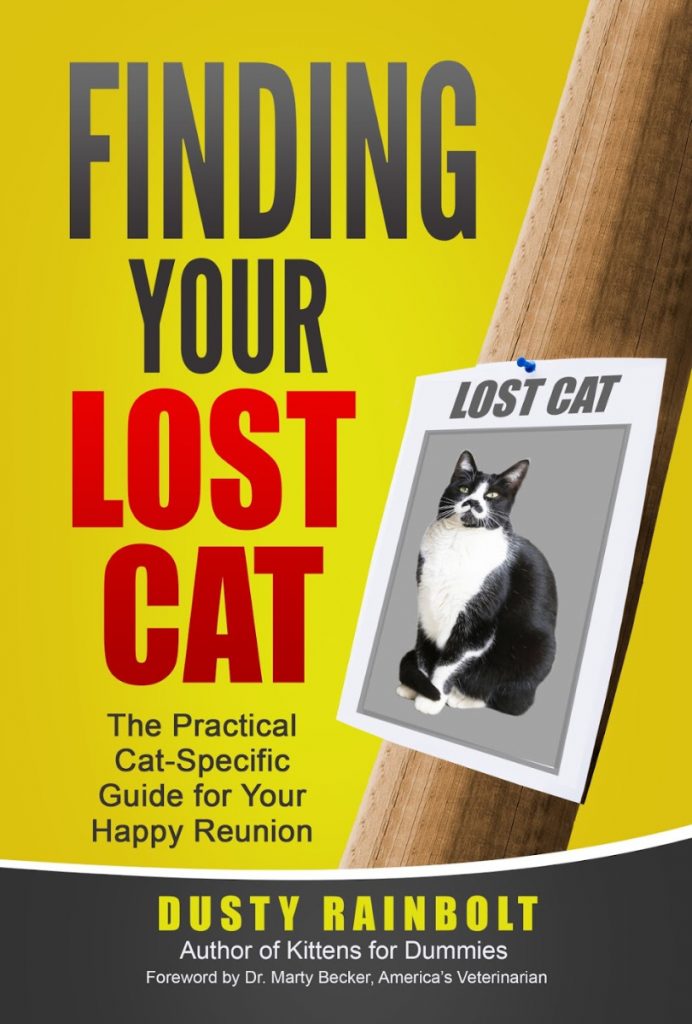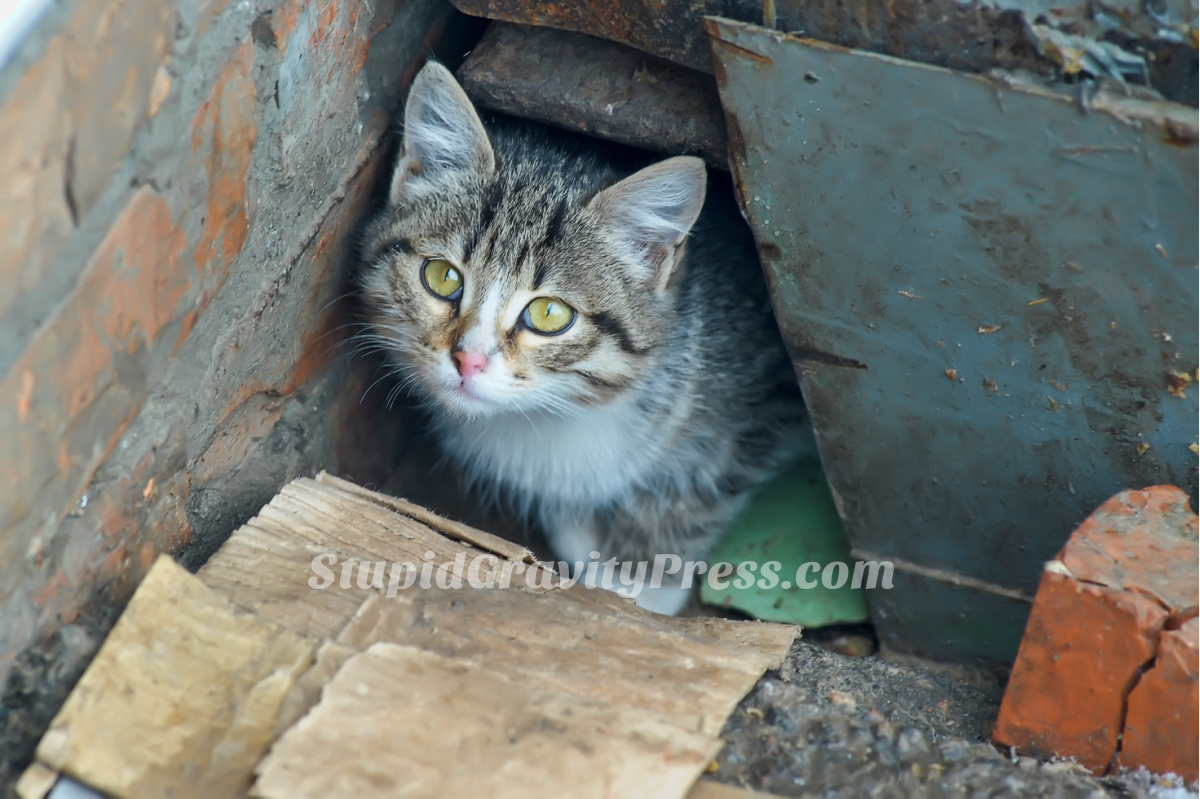
July is Lost Pet Prevention Month. Losing a pet is something no one wants to thinks about, but it can happen to anyone. The cat slips past the door when you bring in the groceries or when someone leaves the door ajar.
Cat owners make a number of assumptions about their pets becoming lost, and unfortunately, many of them are wrong, which could have tragic consequences.

Dusty Rainbolt, author of the recently-released award-winning book, Finding Your Lost Cat: The Practical Cat-Specific Guide for Your Happy Reunion, wants cat owners to have a better understanding of the lost cat dilemma.
Statistics from the American Humane Association, indicate that one in three pets will go missing at some point in their lives. According to Rainbolt, an in-the-trenches cat rescuer and expert in feline health and behavior, lost cat recovery statistics are depressing.
Scientific research conducted out of Ohio State University shows that cats are much less likely to be safely returned than dogs.
“That’s because dog and cat owners, as well as bystanders on the street, approach a missing cat differently,” Rainbolt says. “Because of the come-and-go nature of the cat, most owners don’t realize they’re missing until they’ve been gone for days, maybe even a week. By that time, animal shelters may have either euthanized the kitty or signed him over to a rescue group for adoption.”
Should a cat accidentally escape, Rainbolt said the owner should start to search immediately. “Call animal control right away. Go to the shelter and look at the cats in person. Check back frequently.”
Lost cat signs are the most effective thing a cat owner can do to get their cat back, Rainbolt says. “Make them large enough to read from a distance.
According to Rainbolt, here are four common myths about lost cats:
- IF MY CAT GETS LOST, HIS MICROCHIP WILL RETURN HIM.
Not necessarily. “A microchip does have the ability to return a lost pet to his owner,” Rainbolt says. “However, for that to happen, the animal has to be caught and scanned by a shelter, rescue group or veterinarian with a microchip scanner. Even then it’s not a guarantee. The owner contact information must be current for the rescuer to be able to contact you. If you haven’t notified the database company about your new cell phone number, work number or email address, the microchip won’t help at all.” As soon as you have you have new contact information, notify the microchip database. Once a year, verify your contact information is accurate.
“If you don’t know who runs the database your cat (or dog) appears on, take the pet to the vet or the animal shelter and ask them to scan for the chip. They can give you the contact number for the company,” she says.
- PUT YOUR CAT’S USED CAT LITTER IN YOUR YARD SO HE CAN FIND HIS WAY HOME.
This myth is all over the internet. It’s a classic example of, “It seemed like a good idea at the time.” However, cat urine contains territorial pheromones that communicates with other cats which territory belongs to whom. The scent of pheromones in soiled litter may attract the aggressive tomcat from down the street, forcing Fluffy from his hiding spot near home and chase him farther away.
- A LOST CAT CAN TAKE CARE OF HIMSELF.
That seems logical. A healthy kitty should be able to eat mice. Unfortunately, if Fluffy didn’t learn to hunt and kill from his mother, he likely won’t be able to kill enough prey to survive on.
- YOU USE THE SAME TECHNIQUES TO FIND BOTH DOGS AND CATS.
“Cats are not little dogs physically or behaviorally. Techniques that successfully recover lost dogs won’t work for kitties because cats and dogs respond differently to frightening situations and strange people,” Rainbolt says. Unlike dogs, cats don’t usually travel great distances; unless something extraordinary happened, they usually stay within three or four houses away from their own hour. They seldom ask people for help. Instead, they often hide, too afraid to respond even when the owner calls for him.
While there are dozens of books about lost pets, Rainbolt combines scientific research and her intimate knowledge of cat behavior to help determine which cat-specific strategies work for your situation and how to implement them most effectively. In addition to her own vast experience, she teams up with the country’s leading missing pet locators (pet detectives), as well as advertising specialists and cat parents who found their feline friends after months and even years. Finding Your Lost Cat’s advice is science-based, but Rainbolt’s light touch and trademark humor makes this difficult topic easier to digest.
Rainbolt has long been an advocate for cats in trouble. Over the past 35 years,she has rescued and rehomed over 2500 homeless cats and kittens. Because of her work with displaced kitties, she was inspired to write, Finding Your Lost Cat.
Dusty Rainbolt is an award-winning cat behavior author, veterinary journalist, feline behavior consultant and Fear Free Certified® Professional. She is the author of five feline health and behavior books, including the acclaimed Cat Scene Investigator™: Solving Your Cat’s Litter Box Mystery, Finding Your Lost Cat, Kittens for Dummies and thousands of articles and columns. Over the years, she has successfully hand-raised over 1500 surviving orphan kittens, and rescued and rehomed more than 2500 homeless cats and kittens. She’s the past president of the Cat Writers’ Association, three-time recipient of the Friskies Writer of the Year, and two-time recipient of the prestigious Cornell Feline Health Center Veterinary Issues Award. Her books, columns and articles have been honored with more than 65 writing awards.
Finding Your Lost Cat: The Practical Cat-Specific Guide for Your Happy Reunion is available in trade paperback and ebook Amazon, Barnes and Noble, Ingram and other major book distributors. The suggested retail prices are paperback/$12.99 and ebook/$6.99.









